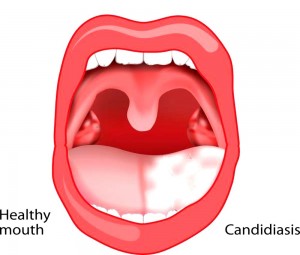Thrush (also called Candidiasis or moniliasis) is a fungal infection that occurs when the yeast Candida albicans reproduce in large numbers. It is common among denture wearers. Most often it occurs in people with weak immune systems—the very young, elderly or those debilitated
by disease, such as diabetes or leukemia. In addition, people with dry mouth syndrome are susceptible to candidiasis. Candida may also flourish after antibiotic treatment, which can decrease normal bacteria in the mouth.
Controlling candidiasis means focusing on preventing or controlling the condition that causes the outbreak.
Good oral hygiene is essential. Clean your dentures to remove Candida and remove them at bedtime. If the cause is dry mouth saliva substitutes and prescription medications may be helpful when the underlying cause of dry mouth is incurable or unavoidable.
What Are the Symptoms?
White, slightly raised areas in your mouth are common signs of thrush. They’re usually found on your tongue or inner cheeks. They can also appear on the roof of your mouth, gums, tonsils, or the back of your throat. These areas may look like cottage cheese. They can be painful and may bleed slightly when you scrape them or brush your teeth.
In very bad cases, they can spread into your esophagus and cause:
• Pain when you swallow or difficulty swallowing
• A feeling that food is stuck in your throat or in the middle of your chest
• Fever, if the infection spreads beyond the esophagus
The fungus that causes thrush can spread to other parts of the body, like the lungs, liver, and skin. This happens more often in people with cancer, HIV, or other conditions that weaken the immune system.
How Will I Know if I Have It?
Your dentist or doctor can probably tell by taking a look inside your mouth. Your doctor might also send a tiny sample of the spot to a lab just to make sure.
If the fungus that causes thrush spreads into your esophagus, you may have to have other tests,
like:
• A throat culture (a swab of the back of your throat)
• An endoscopy of your esophagus, stomach, and small intestine
• X-rays of your esophagus
What’s the Treatment?
Thrush is easy to treat in healthy children and adults. But the symptoms may be worse and
harder to treat in people with weak immune systems.
Your doctor will probably prescribe antifungal medications that you’ll have to take for 10 to 14
days. These come in tablets, lozenges, or liquids, and are generally easy to take.
Since the infection can be a symptom of other medical problems, your doctor may also want to
run other tests to rule these out.
How Can I Prevent Thrush?
- Practice good oral hygiene. Brush your teeth at least twice a day and floss at least once a day.
- Get regular dental checkups. Especially if you have diabetes or wear dentures.
- Even if you’re healthy and don’t have dental issues, you should get your teeth cleaned by your dentist every 6
months.




